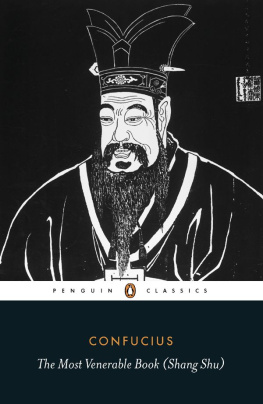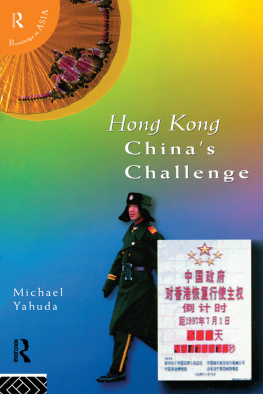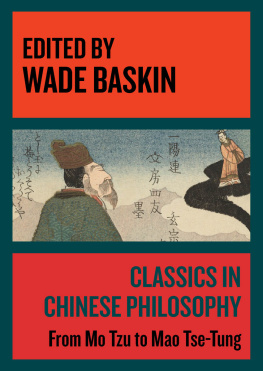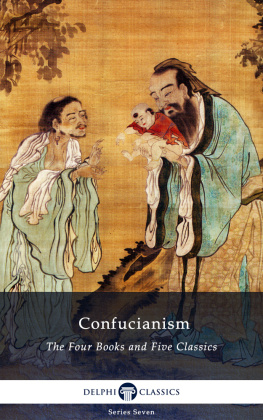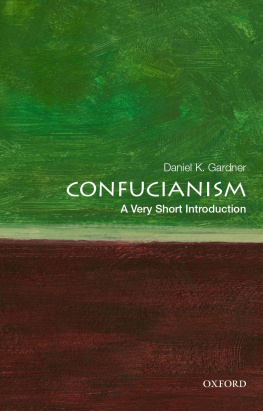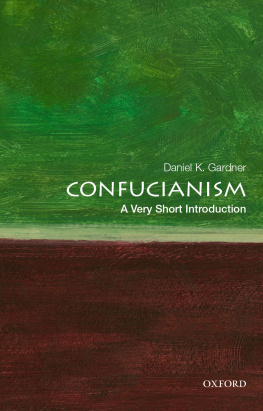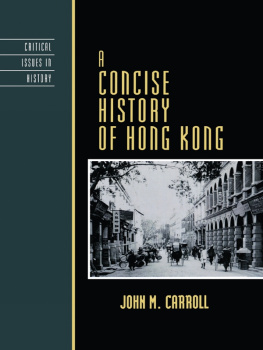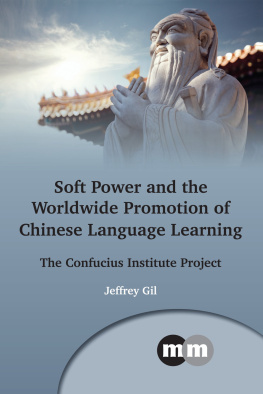CONFUCIUS

Copyright 2015 by Michael Schuman
Published by Basic Books
A Member of the Perseus Books Group
All rights reserved. Printed in the United States of America. No part of this book may be reproduced in any manner whatsoever without written permission except in the case of brief quotations embodied in critical articles and reviews. For information, address Basic Books, 250 West 57th Street, New York, NY 10107.
Books published by Basic Books are available at special discounts for bulk purchases in the United States by corporations, institutions, and other organizations. For more information, please contact the Special Markets Department at the Perseus Books Group, 2300 Chestnut Street, Suite 200, Philadelphia, PA 19103, or call (800) 810-4145, ext. 5000, or e-mail
Designed by Jeff Williams
Library of Congress Cataloging-in-Publication Data
Schuman, Michael.
Confucius : and the world he created / Michael Schuman.
pages cm
Includes bibliographical references and index.
ISBN 978-0-465-04057-5 (e-book)
1. Confucius. I. Title.
B128.C8S38 2015
181'.112dc23
2014047092
10 9 8 7 6 5 4 3 2 1
TO EUNICE, MY FAVORITE CONFUCIAN
CONTENTS
I never expected a Chinese man who lived 2,500 years ago to crash my wedding.
In the spring of 2009, I married my longtime girlfriend, Eunice, who is a Korean-American journalist, and although the main ceremony was planned as a standard white-dress, Judeo-Christian affair, she also wanted to add a Korean ritual called a paebaek. Eunice would change into a traditional, brightly colored, flowing Korean gown known as a hanbok, and both of us would bow down before her parents. Then they would offer us a blessing and toss walnuts and dates into her billowing skirt as an encouragement of fertility.
When Eunice informed me about the paebaek I got a sick feeling in my stomach. I was extremely uncomfortable with bowing. The ritual demanded a highly stylized, obsequious, forehead-to-the-floor kind of bow. Growing up Jewish, I was taught that people should have respect for themselves and not bow down before anyone. The Bibles Book of Esther, read during every Purim celebration, tells of how a vengeful Persian official almost annihilated the local Jews because one Jewish man refused to bow before him. Even God rarely merits a full prostration in modern Jewish religious practice. More commonly, we merely bend our knees and briefly dip our heads as a sign of deference to the Almighty. But in East Asia, bowing is a regular feature of everyday life, a routine method of being polite to others, especially those in authority. People bow to older family members, bosses in the office, government officials, even seniors at universities. A friend of mine who spent many years working in Tokyo once joked that you know youve been in Japan too long when you start bowing while talking on the phone.
Bowing to Eunices parents was not quite the same as these other, run-of-the-mill types, however. The gesture carried greater weight and meaning. In Korea, as in the rest of East Asia, parents are often treated with a degree of reverence rarely witnessed in the modern West. By bowing to Eunices father, I would be fulfilling my proper duty as the new son-in-law. If I refused, Id be setting off a crisis before my wedding and instigating who-knows-what with my irate bride.
I could thank Confucius for my predicament. The famous Chinese philosopher, born in the sixth century BC and better known in China as Master Kong, or Kongzi, considered filial piety the foundation of a peaceful and prosperous society, and the continuing centrality of the concept is one of the most enduring of his legacies. According to Confucius, there is no more important relationship within society than that between father and son. The duty of a son (or in my case, a son-in-law) to show filial respect was paramount and among the most basic tenets of human virtue. The morals and rules of propriety learned within the family are easily transferable to society at large. If children acted with deference toward their parents, they would generally interact appropriately with others at school, work, or a dinner party. Confucius believed that if each member of a family understood and fulfilled his or her prescribed role, the entire world would find its proper order. In other words, by bowing to Eunices parents, I would be reinforcing harmony in society and contributing to nothing less than the cosmic balance between man, the world we live in, and Heaven itself.
Heavy stuff indeed. With so much importance embedded in the paebaek, I should have just kept my mouth shut and pressed my face to the floor. Confucius always expected people to comply with such social rituals, because he thought they formed the basis for peaceful, respectful interaction between different members of a community. But I guess Im not a very good Confucian. I decided to take a chance and express to Eunice my discomfort with the deferential ceremony. Maybe Id catch a break.
I should have known better. Although Eunice is far from being a traditional Korean girlshe was born and raised in the midwestern United Statesshe can suddenly become very Confucian, especially when it comes to her parents, for whom she cares deeply. When I told her of my misgivings about the paebaek, her Confucian heritagethose core family values that Korean parents instill in their children all over the worldcame bubbling to the surface from some rarely tapped cistern buried within her. She considered the paebaek so important that the issue was nonnegotiable. Get over it, she shot back. I could practically hear the old sage rapping his cane on the floor and scolding me from the grave.
So, with difficulty, I set aside my reservations. The morning of the wedding, I asked her younger brother James for bowing lessons. I couldnt just bow any way I wanted; it had to be the right kind of bow. We found an isolated hallway at our hotel, and James gave me an emergency tutorial. While still standing, place your hands at the forehead, with the thumbs and forefingers forming a triangle between them. Then, with your hands in that positionrather than helping you to balancelower yourself onto your knees. Next, bend over until your hands and forehead are plastered to the floorboards. Maintain that position for a few seconds, lift up your head, again without using your hands, and remain on your knees until the parents have finished speaking.
As the paebaek began, my heart was racing. It was easily the most nerve-wracking moment of my wedding. The fact that my closest friends were watching probably didnt help. But I got through the ceremony without embarrassing myself or insulting anyone, and it pleased Eunices father immensely. I took a deep breath of reliefuntil events took an unexpected turn. Eunices parents insisted that we repeat the paebaek with my own mother. Although my mother was well aware of my discomfort with the ceremony, she readily accepted and, much to my dismay, reveled in watching her son bow before her. I guess were all Confucians at heart.
CONFUCIUSS ATTENDANCE AT my wedding ceremony is just one very minor example of the influence the great sage still wields today. Twenty-five hundred years after Confucius first expounded his ideas, they remain ensconced within the societies of East Asia, having survived endless political upheavals, economic metamorphoses, and a torrent of foreign doctrines, religions, and cultural influences. Although in recent decades East Asia has undergone fantastically accelerated modernization, there is still simply no way to interact with a Chinese, Korean, or Japanese person without understanding, and contending with, the ancient ideals of Confucius. His teachings can be discovered in ministerial offices and parliament houses, governing how officials craft policy and relate to their citizens; in corporate boardrooms and on factory floors, guiding CEOs on business strategy and human resources; in schoolrooms, dictating how teachers educate their students; and in bedrooms, intruding on relations between husbands and wives. Confucius influences how East Asians think about democracy, raise children, choose careers, socialize at the office, and understand their own identities. You cant successfully conduct business, negotiate with a government official, make sense of the issues that arise when dating, or comprehend what motivates East Asians today without an appreciation of Confucius.
Next page

